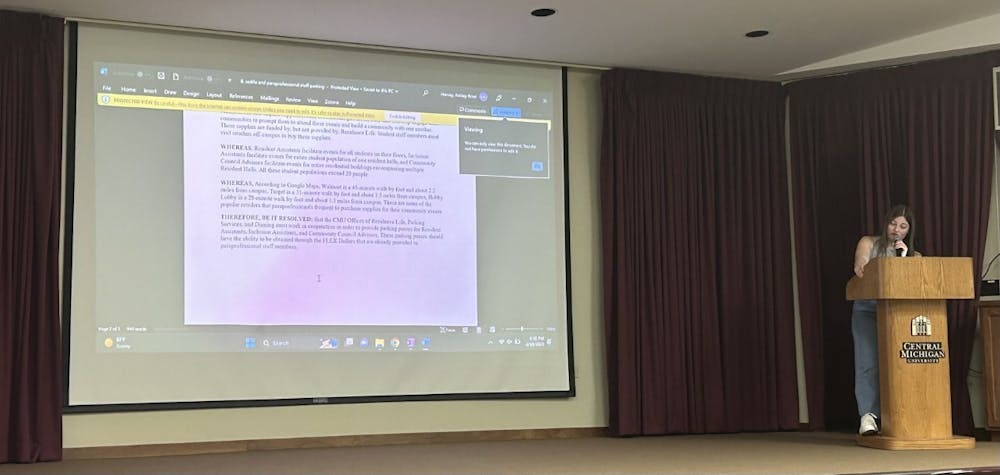SGA introduces new legislation, approves severe weather bill

On Monday night, Central Michigan’s Student Government Association voted to approve legislation that could improve the university’s severe weather preparedness.
John Jones introduced the legislation last week, when it was up for discussion with one of the co-authors, Haley Palmquist. Jones is the SGA representative for the CMU student chapter of the American Meteorological Society, and Palmquist represents Mid-Mitten Weather View at CMU.
The legislation is intended to make sure students, staff and faculty on campus understand what to do in severe thunderstorm or tornado warning and watch situations.
In the legislation, the authors said students from areas that don’t have tornadoes the way Michigan does could be less prepared coming to CMU.
“These students, who may not have experienced regular tornado drills in primary and secondary school, may be particularly vulnerable to a severe weather emergency,” according to the legislation.
The legislation focuses on four areas of change:
- Encouraging residence halls to conduct tornado drills once per academic year;
- Encouraging residence hall employees to receive training on directing students in case of a severe weather emergency;
- Having CMU Emergency Management explain to professors how to handle severe weather emergencies with their classes; and
- Placing tornado shelters on the lowest floor of every building.
Jones said he utilized the recommendations he got from the House and Senate last week to create the final draft of the legislation, formally titled “A Resolution to Ensure Effective Severe Weather Preparedness and Response on Campus."
The legislation passed unanimously in the House of Representatives within SGA before moving on to discuss four more pieces of legislation.
New legislation
The first of four pieces of legislation brought to the House for preliminary discussion is titled “A Resolution to Standardize Stair Nosing Regulations on Campus.”
This legislation, as explained by one of its authors, aims to improve accessibility and safety on campus for students who have visual impairments. "Stair Nosing" refers to the black tape used on stairs to make each more visible.
“Student Government Association recommends the establishment of standardized regulations for all on-campus buildings, requiring that stair noses on all staircases be marked both visually and tactilely for the safety of the staff, faculty, and student populations,” according to the legislation.
This would encourage the installation of gritty black tape on stairways in eight different buildings around campus, modeled after what already exists in the Herbert H. and Grace A. Dow College of Health Professions.
The tape would make individual stairs more distinctive for visually impaired individuals who aren't completely blind.
According to the legislation, the installation would cost approximately $100 per building, totalling approximately $800 for all of the intended buildings.
Lauren Hull, a representative for the College of Education and Human Services, introduced two pieces of legislation that she wrote herself.
The first is “A Resolution to Improve Reporting Mechanisms for Student Employees on Campus,” intended to make it easier for student employees to address concerns about their working conditions.
A survey of student employees in preparation for the legislation showed that 69.8% of student employees had not been made aware of their rights by their employer, and 77.4% did not know how to get help if their rights had been violated.
If passed, this legislation would encourage Student Employment Services to clarify pathways to reporting issues students have with their employers and require employers to post this information in the workplace. It would also ask SES to conduct a survey during the academic year 2025-26 to gauge the effectiveness of these efforts based on employee awareness.
The second piece of legislation Hull introduced Monday night would make some changes to SGA bylaws around executive board elections, if passed.
Hull clarified that in writing this she did not mean to imply any wrongdoing in the recent election or any previous elections, she simply wanted to close a loophole.
Under the current system, information about the election process is distributed by the election committee. This group is not democratically appointed, though, and instead chosen by the election director, who in turn had to be appointed by the current SGA president.
The legislation is pointing out one oversight in the election process.
“The current process for appointing members of the election committee does not include the consensus of the Student Government Association membership thereby creating the potential for patronage or abuse,” according to the legislation.
The legislation proposes six changes to SGA election bylaws:
- Confirming the appointment of election committee members with a two-thirds majority vote in the House and Senate.
- Representatives seeking election must revoke their involvement in the election process for that academic year.
- Any SGA executive board members involved in both the governance of the election process and running as a candidate will meet with the faculty advisor to gauge the integrity of the election.
- If the elections director fails to comply with any requirements, they will meet with the faculty advisor to gauge the integrity of the election.
- Any candidate who feels mistreated during the election process is entitled to a meeting with the faculty advisor and current president and vice president to determine if redress is appropriate.
- Candidates running for executive board positions retain the ability to complete work for SGA that is disconnected from the election process.
The final piece of legislation introduced Monday night would allow student employees of the residence halls to spend their flex dollars to purchase a parking permit. The proposal argued that driving is a required activity to perform the jobs of residence assistants, inclusion assistants and community council advisors who are tasked with putting on monthly events for residents in their communities.
Because the house does not vote on legislation the same day it is introduced, these four new bills were only up for discussion this week, but may be brought up for a vote at a future meeting.



